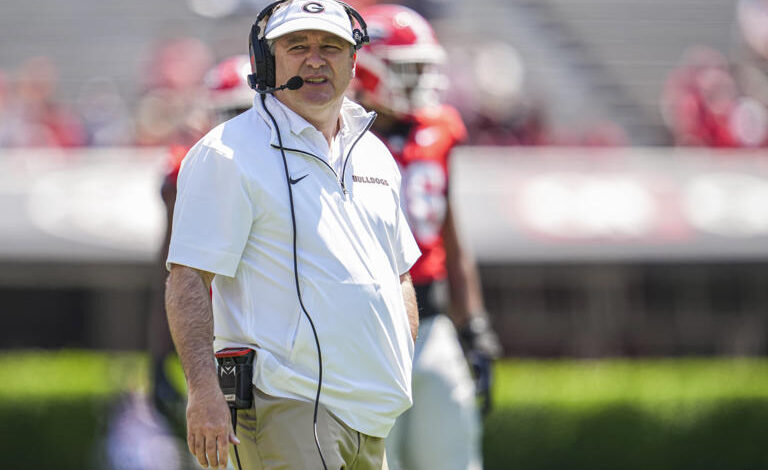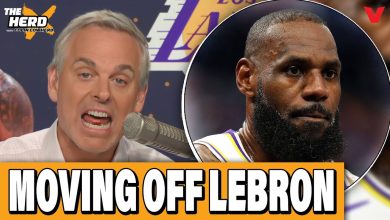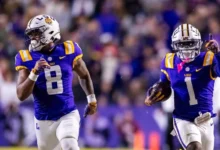Paul Finebaum expressed skepticism about Georgia’s dominance, stating he’s not fully convinced of the Bulldogs’ strength and doubting their ability to maintain their college football powerhouse status.

In the world of college football, dominance is often measured by sustained success, convincing victories, and the ability to adapt to changing competitive landscapes. Georgia, under head coach Kirby Smart, has emerged as one of the premier programs in recent years, capturing multiple national championships and establishing themselves as a perennial powerhouse. However, even in such a successful era, voices of skepticism occasionally surface. One notable figure is Paul Finebaum, a renowned college football analyst and radio host, who has publicly expressed doubts about Georgia’s long-term strength and their ability to maintain their status as a college football powerhouse.
This skepticism from Finebaum is significant because his voice carries weight within the college football community, often shaping public discourse. To understand his viewpoint thoroughly, it’s essential to explore the context behind his comments, the reasons fueling his doubts, and what this means for Georgia’s future.
The Context: Georgia’s Recent Rise and Success
Georgia’s ascent to college football dominance has been remarkably rapid and impressive. Since Kirby Smart took over as head coach in 2016, the Bulldogs have transformed into a top-tier program. Their 2021 and 2022 national championships, along with consistent appearances in the College Football Playoff, underscore their elite status.
Georgia’s success is built on a strong recruiting pipeline, a formidable defense, and strategic coaching. Their defense, often ranked among the best in the nation, has been particularly notable, and their ability to reload talent has kept them competitive year after year. Additionally, their recruiting classes have consistently ranked at or near the top nationally, fueling their sustained success.
Despite this, some analysts and fans have begun to question whether Georgia’s recent dominance can be maintained over the long term, especially as other programs ramp up their efforts and the landscape of college football continues to evolve.
Paul Finebaum’s Skepticism: Why He’s Not Fully Sold on Georgia
Paul Finebaum’s skepticism stems from several interconnected concerns:
1. Recruiting and Player Turnover
While Georgia has been excellent at recruiting top talent, college football is highly transient. The NFL Draft, transfers, injuries, and academic attrition mean that even the best teams experience significant roster changes year over year. Finebaum questions whether Georgia can sustain the level of talent they currently boast, especially considering the high turnover of players.
He suggests that the Bulldogs’ recent success might be partly due to a “perfect storm” of recruiting and coaching, which could be difficult to replicate consistently over multiple seasons. He points out that other programs are closing the talent gap by investing heavily in recruiting and facilities, making the college football landscape more competitive.
2. Strength of Competition
Finebaum emphasizes that college football is increasingly competitive at the top. Programs like Alabama, LSU, Ohio State, and others are also investing heavily and have the resources to challenge Georgia regularly. He questions whether Georgia’s recent dominance is sustainable once these programs elevate their own play and recruit at comparable levels.
Furthermore, the SEC, while still the most competitive conference, features multiple programs capable of winning national titles. Finebaum argues that Georgia’s window of dominance might be narrower than fans think, especially if other teams improve their consistency and strategic approaches.
3. Coaching and Tactical Evolution
While Kirby Smart is widely regarded as one of the top coaches, Finebaum notes that coaching is subject to change and evolution. He questions whether Georgia’s current coaching staff can continue to innovate and adapt, especially against opponents who might develop schemes specifically designed to counter Georgia’s strengths.
Finebaum suggests that success in college football often depends on tactical flexibility and the ability to evolve. If Georgia’s coaching staff becomes predictable or fails to adapt to new offensive or defensive trends, their dominance could wane.
4. Injuries and Variability
Finebaum points out that injuries and unpredictable variables can derail even the most talented teams. While Georgia has been fortunate with health in recent years, an injury to a key player or a series of setbacks could impact their ability to sustain dominance.
He emphasizes that no team is invincible, and the unpredictability inherent in college football means that even the most talented squads can falter.
The Broader Implications of Finebaum’s Viewpoint
Finebaum’s skepticism doesn’t necessarily mean he believes Georgia will fall from the top immediately. Rather, he’s cautioning against overconfidence and urging fans and analysts to recognize the volatility and competitive nature of college football.
His stance encourages a more nuanced view—acknowledging Georgia’s achievements but also understanding that sustained excellence requires continuous effort, innovation, and adaptation. It’s a reminder that dominance is often temporary and that programs must constantly evolve to stay ahead.
Is Georgia’s Success Sustainable?
While Finebaum raises valid concerns, many analysts believe Georgia’s current trajectory is sustainable due to several factors:
- Strong Recruiting: Georgia’s recruiting classes remain among the best nationally, ensuring a pipeline of elite talent.
- Program Infrastructure: The university has invested heavily in facilities, training centers, and support staff, which can help maintain competitive excellence.
- Coaching Stability: Kirby Smart’s leadership has been stable and effective, and his recruiting prowess is widely recognized.
- Culture of Excellence: Georgia has cultivated a culture of winning, resilience, and strategic discipline that can endure.
However, critics like Finebaum remind us that no program is immune to the shifting tides of college football.
The Future: What Can Georgia Do to Maintain Its Status?
To address skepticism and sustain their elite status, Georgia must:
- Continue investing in recruiting, facilities, and player development.
- Adapt tactically, embracing innovation in offensive and defensive schemes.
- Manage roster turnover effectively, ensuring depth and experience.
- Maintain coaching stability and foster a culture of continuous improvement.
- Develop resilience to handle injuries and unforeseen setbacks.
A Healthy Debate in College Football
Paul Finebaum’s skepticism about Georgia’s dominance adds an important perspective to the ongoing debate about college football powerhouses. While Georgia’s recent success is undeniable, the landscape remains dynamic, and complacency can be dangerous.
His viewpoint serves as a reminder that sustained excellence in college football requires constant adaptation, strategic foresight, and a bit of luck. Georgia has the talent, infrastructure, and leadership to remain competitive, but the program—and college football in general—must stay vigilant to new challenges.
In the end, Finebaum’s doubts stimulate healthy discussion, encouraging fans and analysts to appreciate Georgia’s achievements while recognizing the competitive, unpredictable nature of college football. The Bulldogs may very well continue their success, but whether they can do so long-term remains a question that only time will answer.









